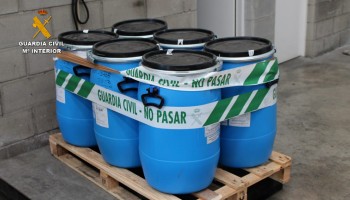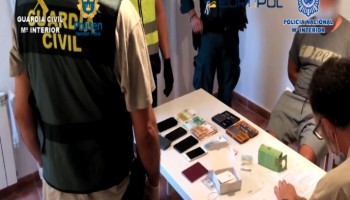On March 7, the Spanish National Police said authorities in Albacete had disbanded a drug trafficking organization following a six-month investigation. Antonio Bueno, Spanish police chief, said the group had three main activities: growing marijuana, exporting it to other countries, and distributing cocaine in Albacete.
A string of raids across the Iberian Peninsula culminated in 10 arrests, along with the seizure of 140 kilos of marijuana and one kilo of cocaine. During the operation, authorities arrested a Swedish citizen who was a central element of the group in obtaining potential clients in European countries and Turkey.
Officials said members of the group used a nationwide network of partners and clients to move marijuana around Spain, Europe and Western Asia. This network allegedly sent large amounts of the drug to Sweden, Lithuania and Turkey.
The group operated through a company in the cargo transport business, using the company’s fleet of trucks and trailers to transport narcotics.
Last October, police stopped a trucker based in Albacete as he approached the border between Spain and France. The man said he was transporting aubergines (eggplants) from southeast Spain to Sweden but authorities discovered 138 kilos of marijuana buds hidden in the load of vegetables.
According to local media, the group’s ringleader had been arrested in 2014 for drug trafficking in the province of Albacete, with more than seven kilograms of cocaine seized at the time. After serving his term, he apparently returned to smuggling, operating the ring out of a mechanical workshop in Albacete.
The Spanish National Police said they targeted five members linked to three marijuana crops on the outskirts of Murcia and Albacete provinces early this year.
Just before Christmas of last year, the leader of the organization was arrested carrying nearly a kilo of cocaine, which he allegedly intended to sell to a dealer in Albacete.
The drug had been allegedly transported to Albacete hidden in modified secret compartments on vehicles. Once in Albacete, the cocaine would be treated and supplied to various drug sales points throughout Albacete province.
The interception has illuminated the way criminal actors working throughout Europe have been relying on the Spanish Mediterranean coast as a base.
Spanish authorities, however, say Spain may be declining in importance despite its historic role as the principal entry point for cocaine in Europe. Other entry points such as Belgium, the Netherlands, Italy, the UK and Germany have all posted sharp increases in seizures, Global Initiative Against Organized Crime and InSight Crime has reported.






